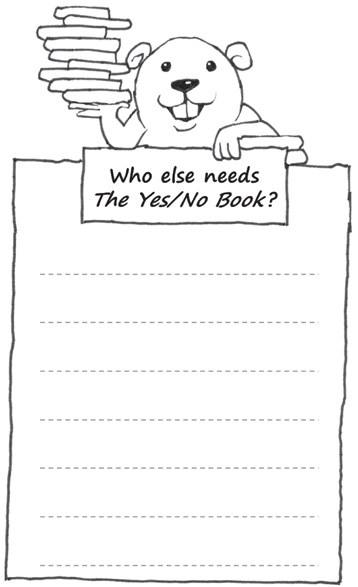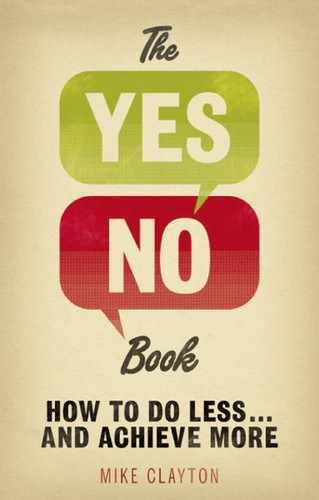APPENDIX
Saying ‘NO’ to…
Here are a few tips and thoughts for making a Noble Objection in some particular cases.
Colleagues and customers
Collaboration is a stated value in a large proportion of the organisations and businesses that I have worked for and in over the years. It can therefore cast saying ‘no’ as a challenge to corporate values. You can therefore feel – or be perceived – as ‘not one of us’ or some form of self-serving loner.
It is therefore vital that your objection is noble. Cast your NO in terms of strategic priorities. Make it clear that saying ‘NO’ is not a refusal to collaborate, but a desire to collaborate and use your time on the right things. Be careful to remember that NO is not a licence to just say ‘no’ to the things you don’t want to take on. It must be noble.
‘The customer is always right.’ If only this were true, decisions would be easy. The challenge is to serve your customer or client with respect and to exceed their expectations, even when they are being disrespectful themselves, or totally unrealistic. But some customers are not worth the effort. They bring a lot of hard work and frustration, but never sufficient custom to truly justify it. The response requires courage – and it may not be your decision to make. But sometimes, the right thing to do is to sack unprofitable customers, or those whose disrespect over-steps a critical line. This will allow you to focus on those customers you want, serving them better, offering them more, and building a stronger relationship.
Deals and decisions
There is a school of thought among professional negotiators that your first response to any request for a concession should be ‘no’. The apparent value of any concessions you do subsequently make will therefore appear so much the higher. That’s just a tactic.
The strategy behind YES or NO in negotiations must encompass a number of key elements and it seems no coincidence that two of the most influential books on the subject of negotiation are Roger Fisher’s and William Ury’s ‘Getting to Yes’ (Houghton Mifflin, 1981) and William Ury’s subsequent Getting Past No (Business Books, 1991). Here are four essential strategies:
- Be able to say ‘NO’: This may seem like an odd injunction, but you will only be able to say ‘NO’ to a bad deal if you know what a good and bad deal look like, and also that you do have alternatives to a bad deal. So Fisher and Ury suggest that you start by identifying your ‘best alternative to a negotiated agreement’ (your BATNA). If you were not able to reach agreement, what would be the best alternative? Any negotiated settlement that is better than that is worth saying ‘YES’ to and any that is worse demands a ‘NO’.
- Say ‘YES’ or ‘NO’ for the right reasons: Don’t get hooked on personalities or behaviours when negotiating. You may like or even adore the counterparty – or you may hate or despise them. What is important is what you are negotiating and the deal that is available.
- Don’t say ‘NO’ if you can still ask for more: At the point where you feel you have to say ‘NO’, you have nothing left to lose. If you don’t ask, you won’t get. So look for more options and ask for another concession. And make it possible for the other person to grant that concession, by offering them something in return.
- Know the value of YES or NO: Ensure that you are able to robustly measure the value of what you are offered and what you are prepared to give in return. Without this capability, you won’t know how close you are to your BATNA – or even on which side of it you lie.
Friends and family
You love them and care about them, and that is what makes it so hard to say ‘no’ to family and friends. But it also means that it is your family and friends who can most drain you of your time and energy. You will often do more to help the people you love than you will do to help yourself. So this makes them a priority for practising your Noble Objection.
Focus on the balance between your relationship on the one hand and your own needs on the other. Both are, of course, important and you will never want to prioritise one to the exclusion of the other. But you must ensure you create a fair allocation to each.
You may find that it helps to share the challenge of saying ‘NO’ with the other person, letting them know why it is important to you, yet you find it difficult. It may also help you, if you ask for permission to say ‘NO’. The answer you get will tell you a lot about the importance of the request and the respect within your relationship. When you do say ‘NO’, it is sometimes helpful to give your personal reasons.
Treats and temptations
It is easy to use the word ‘discipline’, but if it were easy to apply it, then there would be no such thing as temptation. The trick is to decide what is important before temptation comes your way, and to motivate yourself to say NO from two directions.
- Fear of the consequences of unbridled submission to temptation and the exclusively desire-directed behaviour it will lead to.
- The draw of what you will get if you engage in only the goal-directed pursuit of what you have chosen as important.
As in all things in life, balance is the key. Succumbing to a little temptation, in a moderate way from time to time, is harmless desire-directed behaviour. Indeed, it can strip some of the power from the temptation. But if you allow yourself to be controlled by it, it will draw you into addictive and compulsive behaviours that will control you, rather than the other way round.
Irrational thinking
Uncritical and irrational thinking will easily lead you to make the wrong decision. Understand some of the thinking-traps that can lead you down the wrong path. Here are five examples.
- Causation and correlation: It is a common mistake to believe that, because two things occur together, or in sequence, one necessarily causes the other. It may be true, or both may be caused by a third thing or, of course, they may represent a coincidence.
- Anecdotal evidence: Anecdotal evidence is persuasive, but always establish two things: first, is there a bias or possibility of flawed perception? Second, how significant is the amount of anecdotal evidence available, in the context of the whole domain?
- Irrelevant evidence: Some evidence is persuasive but irrelevant. Recent dramatic events can affect our judgement, as can the emotional charge around a situation. Do whatever you can to isolate the facts before making a decision.
- False premise: Sometimes a decision is presented in the form ‘since we know that is true, what necessarily follows is this.’ This may follow from that, but remember to check for yourself whether ‘that’ is indeed true or not.
- Sunk cost: A common decision error is to look at what you have already invested in a venture: the money, the time and your reputation. If these things guide your decision, it will probably be wrong. Always make your decision on the balance between the required future investment and the benefits it will reap. Past investment (or ‘sunk cost’) is irrelevant.
Who else needs The Yes/No Book?
We all know people who could do with more time, less hassle or a more productive life. Who do you know, who could benefit from The Yes/No Book?
Yes/No: Will you recommend it? Will you recommend it? Will you recommend it?
Yes/No: Will you buy them their own copy?
Yes/No: Will you lend them yours?
Yes/No: … Or will you give yours away?

